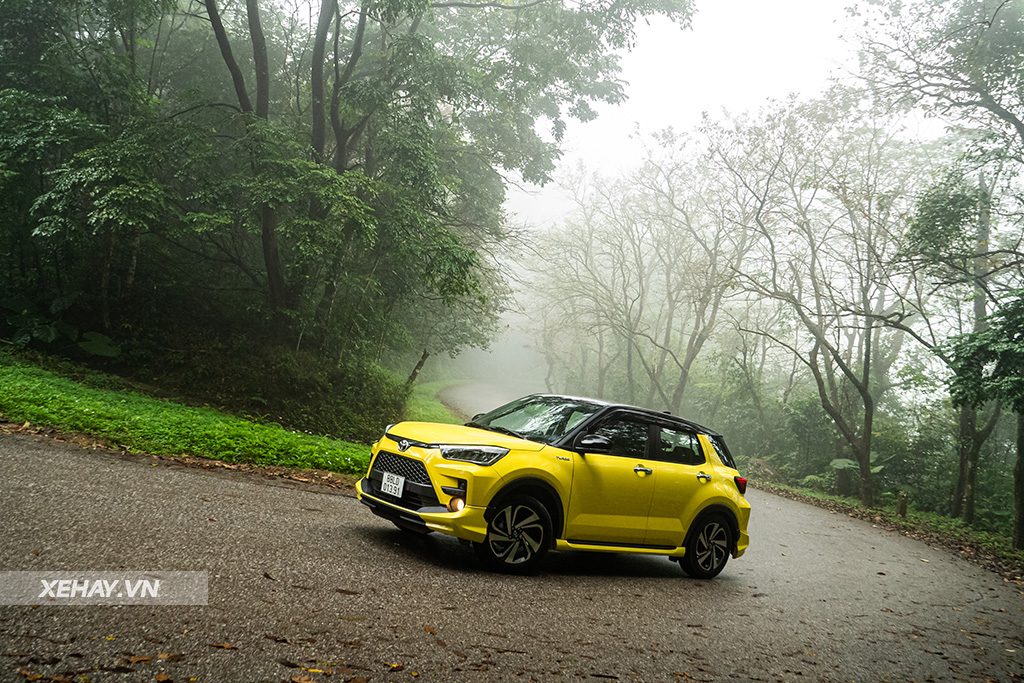Is the 1.0 Turbo engine combined with the CVT continuously variable transmission weak due to its power output of less than 100 horsepower? – To answer this question, the only way is to personally operate the Toyota Raize with diversified conditions to draw the most accurate conclusion.
First challenge: carrying 5 adults
The Toyota Raize will undergo the first test to evaluate its “full load” running ability and passenger cabin space with 5 adults of average height of 1.70 meters and weighing over 350kg.
The front seat space of the Toyota Raize can be considered as sufficiently spacious. While the rear seat appears to be just enough for 3 adults when traveling short distances in urban areas. It would be more comfortable if there are only 4 adults or 2 adults with 1 child sitting in the middle on the second row.
The square design advantage helps create a very spacious cabin space. Combined with the smartly designed inclined rear seats, the rear passengers are less likely to hit their heads on the ceiling – something that many sedans or A or B-class CUV models often encounter.
Compare to other A-segment SUVs, the interior space of Raize can be considered decent and comfortable. The car is prioritized for 4 adults or 5 people including 1 child to ensure comfort for all passengers.
Next challenge: climbing steep hills
Next, with more than 500kg weighing 5 adults plus additional 100kg of filming equipment in the trunk, the car will face the challenge of climbing up to Thượng Đền, a mountaintop in Ba Vi National Park, Hanoi, with slopes exceeding 12 degrees, to assess the power of the Toyota Raize in the most intuitive way.
Although the engine only produces 98 horsepower and 140 Nm of torque, the manufacturer from Japan has optimized the power very well, allowing the car to climb steep hills as if it were… normal. Of course, there won’t be a feeling of comfort or ease, but the car does not feel weak at all! At this point, the gear lever and the Power Mode feature are two extremely useful tools.
In urban driving conditions, the Toyota Raize does not feel sluggish. This A-segment CUV is optimized to exploit power and can even provide the driver with a “fun-to-drive” feeling, thanks to quick, sensitive, and powerful throttle response whenever the driver needs to accelerate at low speeds (below 60 km/h). This can be considered an advantage of a car that weighs just over 1.1 tons.
On highways or long-distance roads, with over 500kg of additional weight, the Toyota Raize still has the ability to overtake other cars. The car does not need to push too hard or strain itself to accelerate at high speeds (80-100 km/h). At high speeds, the D-CVT transmission will switch to gear drive, instead of only operating with a belt like conventional CVT transmissions.
As a result, the transmission ratio is improved (by 12 – 19% efficiency), the acceleration is faster (up to 15%), and fuel efficiency is higher than cars using CVT transmissions. This is directly reflected in the engine’s “roaring” sound when it needs to accelerate, which will be significantly reduced.
So the 1.0 Turbo engine, combined with the D-CVT continuously variable transmission with 98 horsepower, is not weak as it may seem on paper! In fact, the Raize can even provide a satisfying feeling when driven with a youthful style. However, it should be noted that this A-segment CUV from Toyota is still inclined towards a more fuel-efficient driving style rather than a powerful, exhilarating one.
In terms of the price range of 500 million dong, the Toyota Raize meets all the requirements and brings joy in terms of driving power, enough for the driver to confidently take “her” to climb steep hills, go on weekend outings, or drive daily in urban areas.
A compact and well-equipped car – safe
The display behind the steering wheel of the Raize is the most user-friendly feature in the A-segment CUV. In addition to basic information, this screen also displays the steering angle as soon as the car is in D mode – a very subtle point of consideration for new drivers, especially women behind the wheel. When climbing hills, the central screen will also show detailed road slope information, making it look like a “real off-road” vehicle.
At the same time, the Toyota Raize pays great attention to safety. Evidence of this is that the car comes standard with front and rear sensors, a reverse camera, and blind-spot warning on the mirror – leading the segment.
On the other hand, the rear passengers have not been equipped with air vents or mobile device charging ports. These are upgrades that Toyota Raize needs to improve in the future to increase the convenience for the car.
When operating at high speeds on highways, the noise level inside the cabin of the Raize will be relatively loud, especially the sound from the road. Along with not being equipped with cruise control – also an inconvenience when traveling long distances.
With these advantages, it is not surprising that the Toyota Raize is a very successful commercial vehicle. Evidence of this is in the Japanese market, the Toyota Raize is the second best-selling car after the Toyota Yaris, with sales of over 126,000 units. Similarly, in 2021, the Raize ranked 6th with sales of over 81,880 units.
In the Vietnamese market, the Toyota Raize also proves to be a very popular car, receiving a large number of orders right from its launch. The car is always out of stock, and customers will need to make a deposit and wait if they want to own a Raize.
Quick summary after real-world driving tests: the Toyota Raize is a “good car”! Not too powerful, but the Raize is enough to conquer very steep hills, overtake cars on the highway, and bring an exciting feeling in urban areas. Beautiful design, decent interior space in the segment, and a diverse list of convenient and safe features are the points that will undoubtedly continue to make the Toyota Raize hot, especially for young customers and will continue to be in high demand in the near future.
Anh Phan (Tuoitrethudo)
Photos: Minh Đại
[QUICK REVIEW] Toyota Yaris Cross is coming to Vietnam: Putting pressure on Kia Seltos, Hyundai Creta
Positioned right below its “big brother” the Corolla Cross, the Toyota Yaris Cross boasts a fresh design and a range of modern features that are sure to shake up the crowded B-segment SUV market. Competing against formidable contenders such as the Kia Seltos, Hyundai Creta, Honda HR-V, and Mazda CX-30, the Yaris Cross stands out with its sleek design and advanced technology. Get ready to turn heads on the road with this impressive crossover.












































![[QUICK REVIEW] Toyota Yaris Cross is coming to Vietnam: Putting pressure on Kia Seltos, Hyundai Creta](https://vnauto.net/wp-content/uploads/2023/10/xehay-toyotayariscross-14062023-4-150x150.jpg)









